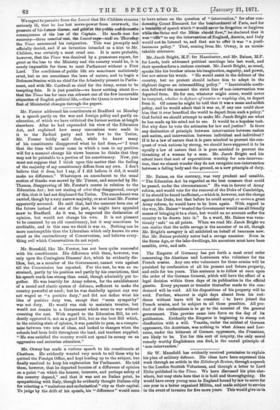Mr. Forster addressed his constituents at Bradford ou Monday in
a speech partly on the war and foreign policy and partly on education, of which we have criticized the former section at length elsewhere. After he had expounded his view of the Education Act, and explained how many concessions were made in it to the Radical party and how few to the Tories, Mr. Forster boldly said that, while he knew many of his constituents disapproved what he had done,—" I trust that the time will never come in which a man in my position will for a moment change his views because he thinks that they may not be palatable to a portion of his constituency. Now, you must not suppose that I think upon this matter that the feeling of the majority of my constituency differs from my own. I don't believe that it does, but I say, if I did believe it did, it would make no difference." Whereupon an amendment to the usual motion of thanks was moved by Mr. Turner, and seconded by Mr. Thomas, disapproving of Mr. Forster's course in relation to the Education Act ; but not stating of what they disapproved, except of this, that it had not displeased the Tories. The amendment was carried, though by a very narrow majority, or so at least Mr. Forster apparently assumed. He said that, had the measure been one of the future instead of one of the past, he might have appealed anew to Bradford. As it was, he respected the declaration of opinion, but would not change his own. It is not pleasant to be censured by an old constituency, but it may sometimes be creditable, and in this case we think it was so. Nothing can be more contemptible than the Liberalism which only knows its own creed as the contradictory of Conservatism, and believes every- thing evil which Conservatives do not reject.






























 Previous page
Previous page